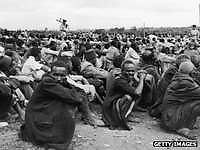A chronology of key events:
c 3.3 million BC - Evidence of some of the earliest human tools have been found in Kenya, suggesting that it was the cradle of humanity from which descendents moved out to populate the world.
Mau Mau uprising
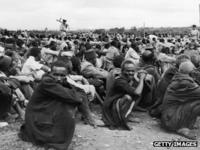
British troops interned tens of thousands of suspected Mau Mau insurgents
600 - Arabs begin settling coastal areas, over the centuries developing trading stations which facilitated contact with the Arab world, Persia and India.
16th century - Portuguese try to establish foothold on Kenyan coast but are driven off by Swahili states and Omani Arabs by late 17th century.
1830s - Omani Arabs consolidate control of coast.
1895 - Formation of British East African Protectorate.
Early 1900s - British settlers move into highlands, railway built from Mombasa to Lake Victoria.
1920 - East African Protectorate becomes crown colony of Kenya - administered by a British governor.
Mau Mau
1944 - Kenyan African Union (KAU) formed to campaign for African independence. First African appointment to legislative council.
1947 - Jomo Kenyatta becomes KAU leader.
1952 - Secret Kikuyu guerrilla group known as Mau Mau begins violent campaign against white settlers. State of emergency declared. Kenyatta arrested.
1953 - Kenyatta charged with management of Mau Mau and jailed. KAU banned.
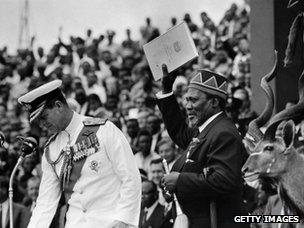 Image captionJomo Kenyatta became Kenya's first post-independence leader in 1963
Image captionJomo Kenyatta became Kenya's first post-independence leader in 1963
1956 - Mau Mau rebellion put down after thousands killed - mainly Africans.
1959 - Kenyatta released from jail but under house arrest.
1960 - State of emergency ends. Britain announces plans to prepare Kenya for majority African rule. Kenya African national Union (Kanu) formed by Tom Mboya and Oginga Odinga.
Independence
1961 - Kenyatta freed and assumes presidency of Kanu.
1963 - Kenya gains independence, with Kenyatta as prime minister.
1964 - Republic of Kenya formed. Kenyatta becomes president and Odinga vice-president.
1966 - Odinga, a Luo, leaves Kanu after ideological split, forms rival Kenya People's Union (KPU).
1969 - Assassination of government minister Tom Mboya sparks ethnic unrest. KPU banned and Odinga arrested. Kanu only party to contest elections.
1974 - Kenyatta re-elected.
Moi era begins
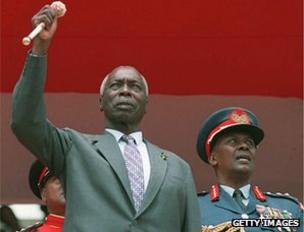 Image captionDaniel arap Moi succeeded Jomo Kenyatta as president, stayed in office until 2002
Image captionDaniel arap Moi succeeded Jomo Kenyatta as president, stayed in office until 2002
1978 - Kenyatta dies in office, succeeded by Vice-President Daniel arap Moi.
1982 June - Kenya officially declared a one-party state by National Assembly.
1982 August - Army suppresses air force coup attempt. Private Hezekiah Ochuka rules for about six hours.
1987 - Opposition groups suppressed. International criticism of political arrests and human rights abuses.
1989 - Political prisoners freed.
1990 - Death of the foreign minister, Robert Ouko, in suspicious circumstances leads to increased dissent against government.
Multi-party elections
1991 August - Forum for the Restoration of Democracy (Ford) formed by six opposition leaders, including Oginga Odinga. Party outlawed and members arrested. Creditors suspend aid to Kenya amid fierce international condemnation.
1991 December - Special conference of Kanu agrees to introduce a multi-party political system.
1992 - Approximately 2,000 people killed in tribal conflict in the west of the country.
1992 August - Ford splits into two factions - Ford-Asili (led by ex-government minister Kenneth Matiba) and Ford-Kenya (led by Odinga).
1992 December - Moi re-elected in multi-party elections. Kanu wins strong majority.
1994 - Odinga dies. Opposition groups form coalition - the United National Democratic Alliance - but it is plagued by disagreements.
1995 - New opposition party - Safina - launched by palaeontologist Richard Leakey. Party refused official registration until November 1997.
1997 - Demonstrations calling for democratic reform. World Bank withholds disbursement of $5bn in structural adjustment credit.
1997 December - Moi wins further term in widely-criticised elections. His main opponents are former vice-president Mwai Kibaki and Raila Odinga, son of Oginga Odinga.
Embassy bomb
1998 August - Al-Qaeda operatives bomb the US embassy in Nairobi, killing 224 people and injuring thousands.
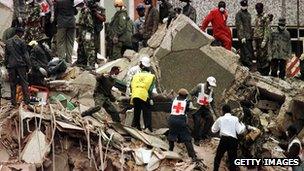 Image captionMore than 200 people were killed when al-Qaeda bombed the US embassy in Nairobi
Image captionMore than 200 people were killed when al-Qaeda bombed the US embassy in Nairobi
1999 - Moi appoints Richard Leakey to head government drive against corruption.
2001 April - Leakey appears in court to face charges of abuse of power and perverting the course of justice.
2001 June - Parliament passes a law allowing the import and manufacture of cheap copies of anti-Aids drugs.
2001 - Ethnic tensions culminate in several violent clashes. In December thousands flee and several people are killed in rent battles involving Nubian and Luo communities in Nairobi's Kibera slum district.
2002 July - Some 200 Maasai and Samburu tribespeople accept more than $7m in compensation from the British Ministry of Defence. The tribespeople had been bereaved or maimed by British Army explosives left on their land over the last 50 years.
2002 November - Terror attack on Israeli-owned hotel near Mombasa kills 10 Kenyans and injures three Israelis. A simultaneous rocket attack on an Israeli airliner fails. A statement - purportedly from al-Qaeda - claims responsibility.
Kibaki victory
2002 December - Elections. Mwai Kibaki wins a landslide victory, ending Daniel arap Moi's 24-year rule and Kanu's four decades in power.
2003 January - Government bill proposes anti-corruption commission. Moi critic John Githongo appointed anti-graft czar.
2003 November - International Monetary Fund (IMF) resumes lending after three-year gap, citing anti-corruption measures.
2003 December - Government decides to grant former president Daniel arap Moi immunity from prosecution on corruption charges.
2004 March-July - Long-awaited draft of new constitution completed. Document requires parliament's approval and proposes curbing president's powers and creating post of prime minister. But deadline for enactment is missed.
2004 July-August - Food crisis, caused by crop failures and drought, dubbed "national disaster" by President Kibaki. UN launches aid appeal for vulnerable rural Kenyans.
2004 October - Kenyan ecologist Wangari Maathai wins the Nobel Peace Prize.
2005 February - Corruption takes centre stage when it is claimed that graft has cost Kenya $1bn under Kibaki. Leading anti-graft official John Githongo resigns. International donors voice unease.
2005 July - Parliament approves a draft constitution after days of violent protests in Nairobi over aspects of the draft which demonstrators say give too much power to in the president's hands.
Constitution spurned
2005 November-December - Voters reject a proposed new constitution in what is seen as a protest against President Kibaki. The president replaces his cabinet; some nominees reject their appointments.
2006 January - Government says four million people in the north need food aid because of a drought which the president calls a "national disaster".
2006 January-February - Government ministers are linked to a corruption scandal involving contracts for a phantom company, Anglo Leasing. One of them, Finance Minister David Mwiraria, resigns and says allegations against him are false.
2006 April - Visiting Chinese President Hu Jintao signs a contract allowing China to prospect for oil off the Kenyan coast. His African tour has focused on trying to satisfy China's hunger for energy and raw materials.
Somali refugees
2006 November - December - Regional flooding renders thousands homeless. Some 100,000 Somali refugees cut off by floodwaters in the north-east are supplied by air drops.
Election violence
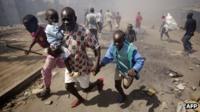
Hundreds were killed in unrest that followed the disputed 2007 polls
2007 December - Disputed presidential elections lead to violence in which more than 1,500 die.
The government and opposition come to a power-sharing agreement in February and a cabinet is agreed in April.
2008 October - Report into post-election clashes calls for international tribunal to try those implicated in violence. Many political leaders are reluctant to implement recommendations, with some arguing that prosecutions could trigger further clashes.
2009 August - Kenya says that at least 10 million people, or one third of the population, are in need of food aid. The government mobilises the military to distribute food, water and medicines to areas hit hardest by drought.
2009 October - The government says it will co-operate with the International Criminal Court (ICC) to try key suspects in post-election violence.
Constitution approved
2010 January - The US suspends $7m of funding for free primary schools in Kenya until fraud allegations are investigated.
Wangari Maathai
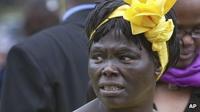
Campaigner fought to promote conservation, women's rights and transparent government
- First African woman to win Nobel Peace Prize
- Given a state funeral
2010 February - President Kibaki overturns a decision by Prime Minister Odinga to suspend the country's agriculture and education ministers over alleged corruption. The row threatens the coalition government.
2010 July - Kenya joins its neighbours in forming a new East African Common Market, intended to integrate the region's economy.
2010 August - New constitution designed to limit the powers of the president and devolve power to the regions approved in referendum.
Controversy over release of national census figures that include tribal affiliations.
2010 December - A grenade explosion kills three people on a Kampala-bound bus in Nairobi.
2011 March - Governments of Kenya, DR Congo agree to investigate illegal gold trade, in which Kenyan allegedly plays a key role.
2011 April - Truth commission begins public probe into 3,000 killings at Wagalla airstrip during a 1984 crackdown on ethnic Somalis, a hushed-up chapter in Kenya's history.
Somalia campaign
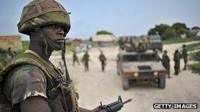
Kenya launched a military operation inside Somalia to curb al-Shabab Islamist militants
Six politicians appear before the International Criminal Court in The Hague, accused of links to 2007-8 post-election violence.
2011 June-September - East Africa hit by worst drought in 60 years.
2011 August-September - Suspected Somali militants raid Kenyan coastal resorts and a refugee camp, targeting foreigners.
Troops in Somalia
2011 October - Kenyan troops enter Somalia to attack rebels they accuse of being behind several kidnappings of foreigners on Kenyan soil. Kenya suffers several apparent reprisal attacks.
2011 November - High court orders arrest of Sudanese President Omar al-Bashir if ever he visits. Sudan orders Kenya's ambassador to leave.
2012 January - International Criminal Court rules that several prominent Kenyans must stand trial over the 2007 post-election violence.
2012 March - Oil discovered. President Kibaki hails it as a ''major breakthrough''.
Launch of Lamu port project which is to become South Sudan's oil export outlet.
2012 May - More than 30 people are injured in an attack on a Nairobi shopping centre, allegedly by Somalia's al-Shabab Islamist militia.
2012 July - Britain acknowledges that its colonial administration tortured detainees during the Mau Mau uprising. Veterans are claiming damages in the High Court in London.
Outbreaks of violence
2012 August-September - More than 100 people are killed in communal clashes over land and resources Coast Province. Junior minister Dhadho Godhana is charged with incitement. He denies the charge.
2013 election
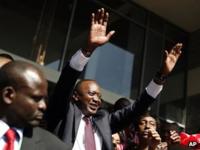
The 2013 vote defied predictions of violence, but Uhuru Kenyatta's win posed a diplomatic headache
Five people die in riots by Muslim protesters in Mombasa after the shooting of preacher Aboud Rogo Mohammed, accused by the UN of recruiting and funding al-Shabab Islamist fighters in Somalia.
2012 November - Troops rampage in the town of Garissa, near the Somali border, after gunmen shoot dead three Kenyan soldiers serving in the African Union mission in Somalia.
2012 December - Deputy PM Uhuru Kenyatta and former minister William Ruto - bitter political rivals facing trial at the International Criminal Court over the 2007 post-election violence - confirm that are forming an alliance for the 2013 election.
2013 March - Uhuru Kenyatta, the son of Kenya's first president, wins presidential election with just over 50% of the vote. A challenge to the results by his main rival, Prime Minister Raila Odinga, is rejected by the Supreme Court.
International Criminal Court (ICC) drops charges against Francis Muthaura, a co-accused of Mr Kenyatta, over the 2007 election violence.
2013 June - The British government says it sincerely regrets the torture of thousands of Kenyans during the suppression of the Mau Mau insurgency in the 1950s and promises £20m in compensation.
2013 September - Deputy President William Ruto pleads not guilty at the International Criminal Court to crimes against humanity charges over the 2007 post-election violence.
Al-Shabab attacks
2013 September - Somali al-Shabab militants seize the Westgate shopping mall in Nairobi and kill more than 60 people, saying they want Kenya's military to pull out of Somalia.
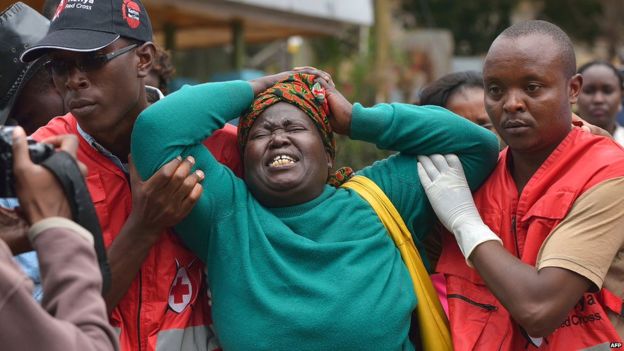 Image captionThe massacre of 148 students at Garissa college in 2015 horrified Kenya and prompted criticism of the security forces
Image captionThe massacre of 148 students at Garissa college in 2015 horrified Kenya and prompted criticism of the security forces
2014 May - Several countries issue travel warnings following several attacks over the past few months blamed on Somali al-Shabab militants.
2014 June - At 48 people die after Islamist militants attack hotels and a police station in Mpeketoni, near the island resort of Lamu.
2014 September - Kenya revises the way it calculates growth, making the economy 25% bigger than previously thought - and fourth biggest in sub-Saharan Africa.
2014 December - Prosecutors at the International Criminal Court drop charges against President Kenyatta over the 2007 post-election violence, citing insufficient evidence.
2015 April - Al-Shabab militants carry out a massacre at Garissa University College in northwest Kenya, killing 148 people.
2015 June - Four Kenyans and a Tanzanian charged with terrorism offences over the Al-Shabab Garissa attack.
2015 July - Barack Obama praises Kenya's progress but urges action to improve gay rights, as he make his first visit to his father's homeland as US president.
